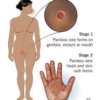Managing Diabetes with Ayurveda: A Holistic Approach
Managing Diabetes with Ayurveda: A Holistic Approach is a chronic condition that affects millions of people worldwide. It is characterized by high blood sugar levels due to the body’s inability to produce enough insulin or effectively use the insulin it produces. While conventional medicine offers various treatment options, many individuals are turning to holistic approaches, such as Ayurveda, to complement their diabetes management. This blog explores how Ayurveda can play a pivotal role in managing diabetes, focusing on diet, lifestyle, herbal remedies, and overall well-being.
Understanding Ayurveda
Ayurveda, an ancient Indian system of medicine, is based on the principle of balancing the body, mind, and spirit. It emphasizes prevention, wellness, and the use of natural remedies derived from plants, minerals, and other natural substances. According to Ayurveda, each individual has a unique constitution or ‘Prakriti,’ which is determined by the balance of three doshas: Vata, Pitta, and Kapha. Understanding your dosha can help tailor treatments and lifestyle choices to maintain optimal health.
The Ayurvedic Perspective on Diabetes

In Ayurveda, diabetes is referred to as ‘Prameha,’ a condition characterized by excessive urination and increased thirst. It is often associated with an imbalance in Kapha dosha, which governs stability, structure, and fluid balance in the body. Ayurvedic practitioners believe that diabetes arises due to poor dietary choices, a sedentary lifestyle, and emotional stress.
Causes of Diabetes in Ayurveda
- Dietary Factors: Consuming excessive sweets, refined carbohydrates, and unhealthy fats can lead to an imbalance in the body, resulting in diabetes.
- Lifestyle Choices: Sedentary lifestyles, lack of physical activity, and poor sleep hygiene contribute to weight gain and insulin resistance.
- Mental and Emotional Well-being: Stress, anxiety, and unresolved emotions can affect hormonal balance and exacerbate diabetes symptoms.
Ayurvedic Dietary Recommendations
A balanced diet is crucial in managing diabetes. Ayurveda emphasizes fresh, whole foods and suggests the following dietary practices:
1. Incorporate Bitter and Astringent Foods
Bitter foods like bitter gourd (karela), neem, and dandelion greens are known to help lower blood sugar levels. Astringent foods, such as legumes, lentils, and green leafy vegetables, can also support metabolic health.
2. Prioritize Whole Grains
Whole grains like barley, quinoa, and brown rice are recommended over refined grains. These provide sustained energy and prevent rapid spikes in blood sugar levels.
3. Healthy Fats
Incorporate healthy fats from sources like avocados, nuts, seeds, and olive oil. These fats can improve insulin sensitivity and provide essential nutrients without causing inflammation.
4. Regular Meal Timing
Eating at regular intervals helps maintain stable blood sugar levels. Aim for three balanced meals and healthy snacks to avoid blood sugar fluctuations.
5. Hydration
Staying hydrated is essential. Herbal teas, infused waters, and coconut water can help maintain hydration without added sugars.
Herbal Remedies for Diabetes
Ayurveda offers a variety of herbs that can support blood sugar management. Here are some commonly used herbs:
1. Bitter Gourd (Karela)
Known for its blood sugar-lowering properties, bitter gourd can be consumed in juice form or as a cooked vegetable.
2. Fenugreek (Methi)
Fenugreek seeds are rich in soluble fiber, which helps lower blood sugar levels. Soaking seeds overnight and consuming them in the morning can be beneficial.
3. Turmeric (Haldi)
Turmeric contains curcumin, which has anti-inflammatory and antioxidant properties. It can help improve insulin sensitivity and reduce blood sugar levels.
4. Cinnamon (Dalchini)
Cinnamon is known for its ability to mimic insulin and improve glucose uptake by cells. Adding cinnamon to your diet can help regulate blood sugar levels.
5. Amla (Indian Gooseberry)
Amla is rich in vitamin C and antioxidants. It supports pancreatic function and helps maintain healthy blood sugar levels.
Lifestyle Modifications
In addition to dietary changes, certain lifestyle modifications can enhance diabetes management:
1. Regular Physical Activity
Exercise plays a crucial role in managing diabetes. Aim for at least 150 minutes of moderate-intensity aerobic exercise per week, combined with strength training. Activities like yoga, walking, and swimming are particularly beneficial.
2. Stress Management
Chronic stress can lead to insulin resistance. Incorporate stress-reducing practices such as meditation, deep breathing, and mindfulness. Yoga can also be an effective way to manage stress while improving physical health.
3. Adequate Sleep
Sleep is vital for overall health. Aim for 7-9 hours of quality sleep each night. Poor sleep can disrupt hormonal balance and lead to increased blood sugar levels.
4. Mindful Eating
Practice mindful eating by paying attention to hunger cues and savoring each bite. This can help prevent overeating and improve digestion.
5. Regular Monitoring
Regularly monitor blood sugar levels to track your progress and make necessary adjustments to your diet and lifestyle.
Emotional Well-being
Emotional health is a significant aspect of diabetes management. Ayurveda recognizes the connection between the mind and body, emphasizing the importance of mental well-being. Here are some strategies to support emotional health:
1. Support Systems
Building a support system with friends, family, or support groups can provide encouragement and motivation.
2. Counseling or Therapy
Consider seeking professional help if you’re struggling with stress, anxiety, or depression. A therapist can provide tools to manage emotions effectively.
3. Journaling
Writing about your experiences, thoughts, and feelings can be a therapeutic outlet. It can help clarify emotions and reduce stress.
Conclusion
Managing diabetes requires a multifaceted approach, and Ayurveda offers a holistic framework that encompasses diet, lifestyle, and emotional well-being. By adopting Ayurvedic principles and incorporating herbal remedies, individuals can achieve better blood sugar control and enhance their overall quality of life.
Remember, it’s essential to consult with a qualified Ayurvedic practitioner or healthcare provider before making significant changes to your diet or lifestyle, especially if you have pre-existing health conditions. With commitment and the right support, managing diabetes through Ayurveda can lead to a healthier, more balanced life.








Leave a reply